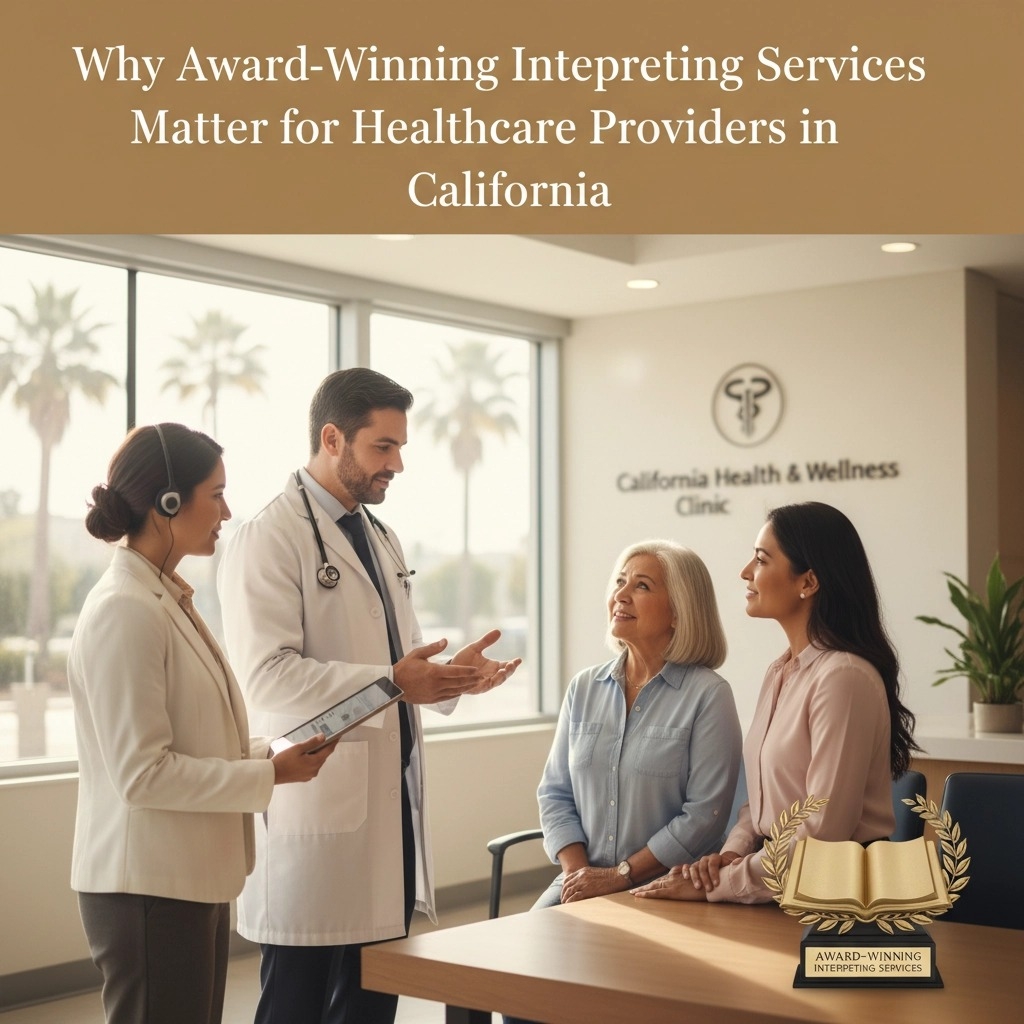Why Award-Winning Interpreting Services Matter for Healthcare Providers in California

Healthcare providers across California face a critical challenge: delivering quality care to an increasingly diverse patient population where nearly half of Medi-Cal recipients speak a language other thanEnglish at home. This linguistic diversity, while enriching our communities, creates significant barriersto effective healthcare delivery. Award-winning interpreting services have emerged as the gold standard solution, transforming how medical professionals communicate with patients and fundamentallyimproving health outcomes across the Golden State.
The Legal Foundation: More Than Just Compliance
Federal and state laws don't just encourage healthcare providers to offer language access services:they mandate it. Title VI of the Civil Rights Act and Section 1557 of the Affordable Care Act requireany healthcare provider receiving federal funding to ensure meaningful access to care through qualified interpreters and translated materials. For California providers serving Medi-Cal patients, this isn'toptional.
The California Department of Health Care Services (DHCS) goes even further, requiring managed careplans to provide free interpretation services, ensure timely access to interpreters, and translate essential documents into patients' preferred languages. Providers who fail to meet these standards face legal penalties, potential loss of federal funding, and reduced patient satisfaction scores that directlyimpact reimbursement rates.
But compliance is just the starting point. Award-winning interpreting services go beyond checkingregulatory boxes: they create comprehensive language access programs that truly serve patients'needs while protecting providers from liability risks.

The Life-Saving Impact on Patient Outcomes
The difference between basic interpretation and award-winning services becomes clear when examining patient outcomes. Research consistently shows that professional medical interpreting services reduce hospital readmission rates for limited English proficiency (LEP) patients by 25%. This isn't just astatistic: it represents thousands of California families who receive better care and avoid preventablemedical complications.
Professional interpreters enable healthcare providers to make accurate diagnoses faster and moreconfidently. When communication barriers are eliminated, doctors can gather complete medical histories, explain complex procedures clearly, and ensure patients understand discharge instructions.The result? Fewer medical errors, reduced malpractice risks, and patients who are better equipped tomanage their health conditions at home.
Consider the cascade effect of miscommunication in healthcare: a patient who doesn't understandmedication instructions may take incorrect doses, leading to adverse reactions or treatment failure. Apatient who can't accurately describe symptoms may receive delayed or inappropriate treatment.These scenarios are preventable with quality interpreting services, making the investment in awardwinning providers a crucial patient safety measure.
California's Unique Linguistic Landscape
California's demographics create both unprecedented challenges and opportunities for healthcare interpretation. With almost half of Medi-Cal recipients speaking a non-English language at home, thedemand for interpreting services far exceeds the supply of qualified professionals. The state currentlyhas only 738 certified medical interpreters serving millions of Californians who need language assistance: a critical shortage that highlights why choosing award-winning services matters.
Recognizing this gap, California has invested $3 million in state funding specifically for medical interpretation services for non-English speaking Medi-Cal recipients. This investment signals the state'scommitment to language access and creates opportunities for healthcare providers to enhance theirinterpreting programs.
The linguistic diversity varies significantly across California's regions. In Los Angeles County, Spanish,Korean, Tagalog, and Armenian are commonly needed languages. The San Francisco Bay Area seeshigh demand for Mandarin, Cantonese, and Vietnamese interpretation. Central Valley agriculturalcommunities often need Spanish and indigenous language interpreters. Award-winning services understand these regional patterns and maintain interpreter networks that reflect local demographics.

What Defines Award-Winning Interpreting Services
Not all interpreting services are created equal. Award-winning providers distinguish themselvesthrough several key characteristics that directly benefit healthcare organizations and their patients.
Rigorous Interpreter Qualification Standards: Top-tier services employ interpreters who hold national certifications, undergo specialized medical terminology training, and participate in ongoingprofessional development. These interpreters understand not just languages, but medical concepts,cultural nuances, and the ethical obligations of healthcare interpretation.
Comprehensive Service Delivery Models: Award-winning providers offer multiple service deliveryoptions: on-site interpretation for critical situations, remote video interpreting for routine appointments, and 24/7 telephonic access for emergency situations. This flexibility ensures appropriate interpretation for every healthcare scenario.
Cultural Competency Integration: Beyond language translation, premier services provide culturalmediation, helping healthcare providers understand how cultural backgrounds influence patient perspectives on health, treatment, and family involvement in medical decisions.
Technology Integration: Leading interpreting services leverage advanced scheduling systems, quality assurance protocols, and data analytics to optimize service delivery and measure outcomes. Theyprovide healthcare partners with detailed reporting on service utilization, patient satisfaction, andcost management.
Operational Excellence and Cost Management
Healthcare administrators often view interpreting services as a necessary expense rather than astrategic investment. Award-winning providers flip this perspective by demonstrating clear operational benefits and return on investment.
Professional interpretation streamlines healthcare delivery by eliminating communication delays andreducing the need for repeat visits due to misunderstandings. When patients understand their treatment plans, they're more likely to follow medical recommendations, reducing costly complicationsand readmissions.
These services also enhance staff efficiency. Rather than struggling through language barriers or relying on family members or staff who speak other languages (both problematic practices), healthcareteams can focus on delivering clinical care while professional interpreters handle communication.
Patient satisfaction scores: increasingly tied to reimbursement rates: improve dramatically when patients receive care in their preferred language. Satisfied patients are more likely to keep appointments, adhere to treatment plans, and recommend the healthcare facility to others in their community.

Excellence in Practice: California Healthcare Leaders
Several California healthcare institutions demonstrate the transformative impact of comprehensive interpreting services. UC Davis Medical Center operates a full-service language access program that includes on-site interpretation, telephonic services, video remote interpreting, and interpreter trainingprograms. Their approach recognizes that language access isn't just about having interpreters available: it's about creating systems that seamlessly integrate interpretation into every aspect of patientcare.
Stanford Health Care has operated their Medical Interpretation and Translation Services program forover five decades, maintaining a team of more than 70 highly trained staff interpreters who provide24/7 coverage in over 200 spoken languages, plus American Sign Language. This longevity demonstrates the sustained commitment required for truly excellent language access programs.
These institutions understand that healthcare interpreting services require specialized expertise, ongoing quality assurance, and deep integration with clinical workflows to achieve optimal results.
Choosing the Right Interpreting Partner
For healthcare providers evaluating interpreting services, several factors distinguish award-winningproviders from basic service offerings. Look for organizations that demonstrate measurable outcomes, maintain rigorous quality standards, and show deep understanding of healthcare operations.
The best interpreting partners provide transparent reporting on service metrics, including interpreteravailability, response times, and patient satisfaction scores. They invest in ongoing interpreter trainingand maintain specializations in medical terminology, mental health interpretation, and other healthcare-specific competencies.
Award-winning services also understand the importance of cultural competency training for healthcare staff, helping medical teams work more effectively with interpreters and better serve diverse patient populations.
Quality interpreting services become strategic partners in improving healthcare delivery, populationhealth outcomes, and organizational performance. When healthcare providers work with experiencedlanguage service professionals, they gain more than translation: they gain expertise in creating inclusive, accessible healthcare environments that serve all patients effectively.
The investment in award-winning interpreting services pays dividends in improved patient outcomes,enhanced operational efficiency, and reduced legal and financial risks. For California healthcareproviders committed to delivering equitable, high-quality care, partnering with recognized leaders inmedical interpretation isn't just beneficial: it's essential for meeting the complex needs of our state'sdiverse communities.